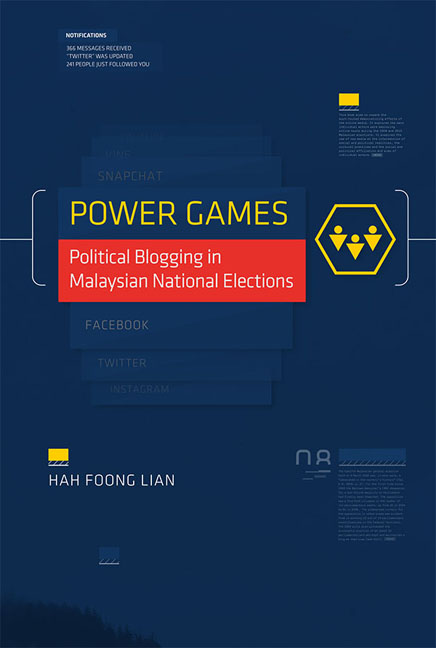Book contents
- Frontmatter
- Contents
- Acknowledgements
- List of Abbreviations of Political Parties
- Introduction
- Chapter 1 The Cultural, Social and Political Fabric of Malaysia
- Chapter 2 Trends in Social Media Use in Malaysian Cyberspace
- Chapter 3 A Political Marketing Tool and a Network of Cyber Battles
- Chapter 4 Psychological Warfare and Leadership Change
- Chapter 5 Negotiating Political Reform and Change
- Conclusion
- Bibliography
- Index
- About the Author
- Frontmatter
- Contents
- Acknowledgements
- List of Abbreviations of Political Parties
- Introduction
- Chapter 1 The Cultural, Social and Political Fabric of Malaysia
- Chapter 2 Trends in Social Media Use in Malaysian Cyberspace
- Chapter 3 A Political Marketing Tool and a Network of Cyber Battles
- Chapter 4 Psychological Warfare and Leadership Change
- Chapter 5 Negotiating Political Reform and Change
- Conclusion
- Bibliography
- Index
- About the Author
Summary
The twelfth Malaysian general election held on 8 March 2008 was, in many ways, a “watershed in the country's history” (Ooi K.B, 2008, p. 6). For the first time since 1969 the Barisan Nasional's (BN) obsession for a two-thirds majority in Parliament had finally been thwarted. The opposition saw a fourfold increase in the number of its parliamentary seats, up from 20 in 2004 to 82 in 2008. The widespread victory for the opposition in urban areas was evident from it winning 10 out of 13 parliamentary constituencies in the Federal Territory. The 2008 polls also witnessed the successful election of at least 20 parliamentarians who kept and maintained a blog at that time (Hah 2012). The unprecedented outcome saw the opposition parties for the first time presenting a united front by challenging the ruling regime to straight contests in Peninsular Malaysia. The informal cooperation of the opposition, involving the Democratic Action Party (DAP), Parti Keadilan Rakyat (PKR) and Parti Islam Se-Malaysia (PAS) saw it, for the first time, being swept into power in four states — Selangor, Perak, Penang and Kedah — commonly known as the urban, western, industrialized corridor of Peninsular Malaysia. The PAS also retained its majority in Kelantan in the 2008 polls. Described as a “political tsunami” (Gan 2008), the result of the 2008 election was far removed from that of the one in 2004 when then prime minister Abdullah Ahmad Badawi annihilated the opposition. In 2004 the BN won 198 out of 219 federal seats, or 90.4 per cent of the total number of parliamentary constituencies it contested.
The new political landscape endorsed at the polls in 2008 prevailed after the country's thirteenth general election, which was held on 5 May 2013. The ruling coalition's dream of regaining its traditional two-thirds majority and to win back the states of Penang, Selangor and Kelantan remained elusive. The electoral performance of the BN slid further as the opposition secured 7 more parliamentary seats. Out of a total of 222 parliamentary constituencies contested in the 2013 general election, the opposition captured 89 federal seats while the BN won 133 seats. However, the ruling coalition managed to re-capture Kedah state and held its grip on Perak.
- Type
- Chapter
- Information
- Power GamesPolitical Blogging in Malaysian National Elections, pp. 1 - 20Publisher: ISEAS–Yusof Ishak InstitutePrint publication year: 2016



